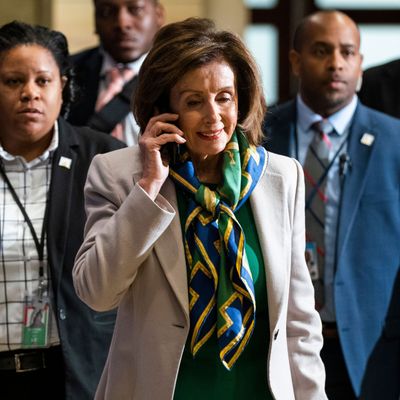
Republicans concerned about the coronavirus crisis and the economic and political fallout from it were probably relieved that their warrior-king in the White House has evolved from full-on denial to some sort of response, however incomplete and even troubling. But other than vaguely laying out his own prescriptions (mostly involving a payroll tax cut that probably isn’t happening), Trump did not offer guidance to Republicans who will face a House vote as early as today on a comprehensive Democratic package aimed at mitigating the economic consequences of the pandemic, as the Hill reports:
Speaker Nancy Pelosi said Thursday that the Trump administration has not endorsed sweeping legislation to address the economic fallout of the coronavirus pandemic, a bill headed to the House floor later in the day.
“We have had ongoing conversations about it. We will be bringing the bill to the floor,” she said as she left a briefing with public health officials in the Capitol basement. “We’ve given a good deal of time for them to review the package, and we’ll go from there.”
Trump himself, in an extended pout over impeachment, hasn’t spoken with Pelosi in months. So she’s pursued other avenues for administration feedback:
Pelosi has been in talks for days with Treasury Secretary Steven Mnuchin in search of a bipartisan deal that could pass through both chambers of Congress.
The Democrats released their proposal late Wednesday, but it remains unclear if Republicans in the White House or on Capitol Hill will jump on board.
Pelosi said the question about bipartisan support is “premature” given that the House bill was unveiled less than 12 hours ago. The House will charge forward regardless of the Republicans’ position, she said.
The draft bill is pretty comprehensive, and includes (according to Roll Call) 14 weeks of paid sick leave, extended unemployment insurance, a new paid emergency leave benefit, food assistance for low-income people and kids whose schools have closed, mandatory waiver of insurance co-pays for virus testing, and supplemental Medicaid money for states that declare a public-health emergency. It certainly differs from the apparent tendency of the administration to limit relief to the employed and to the most urgently affected industries.
Aside from the question of how House Republicans are supposed to vote, the administration’s position will affect what the GOP-controlled Senate will do:
The House legislation was to serve as an opening bid by Democrats as negotiations proceed on a bipartisan economic stimulus package that may be harder to secure before Congress leaves town for a weeklong recess.
The latest reports are not very encouraging:
It’s unclear what this last objection is about, but the complaint does track the general GOP opposition to anything that would preserve, much less expand, Medicaid services or funding. And while an atmosphere of urgency is suffusing most coronavirus discussions, Mitch McConnell seems satisfied with kicking the can past next week’s congressional recess:
And yet:
It might be helpful if Trump stopped pouting and started talking.






























